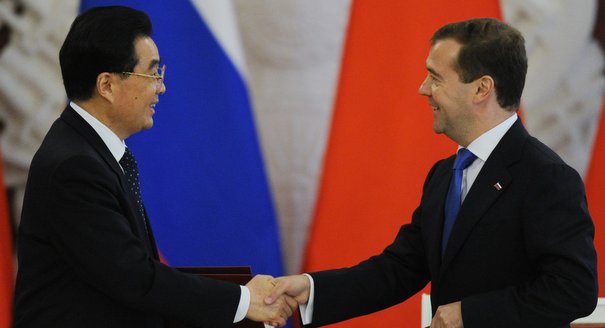Registration
You will receive an email confirming your registration.
IMGXYZ3718IMGZYXChina and Russia have a nuanced and complex relationship, particularly when it comes to nuclear deterrence and arms control. In the first installment of the “China and Russia’s Future” seminar series and the fourth event of the “Arms Control’s Future” seminar series, the Carnegie-Tsinghua Center for Global Policy hosted a delegation of graduate students from the Monterey Institute for International Studies (MIIS) to discuss China and Russia’s strategic interaction with a panel of Chinese students and experts. Carnegie’s Lora Saalman moderated.
Ballistic Missile Defense
- Criticisms of U.S. BMD: One of the MIIS panelists stressed that both China and Russia maintain strong criticisms of the U.S. missile defense program. Although the United States has claimed that these capabilities serve a defensive purpose and target only rogue states, China and Russia remain suspicious about the offensive function of these systems and their potential negation of their nuclear deterrent. A Chinese participant noted that concerns are not simply related to the BMD system itself, but rather what it means for weaponization of outer space. He also pointed to other conventional weapons systems that provoke concern in both China and Russia, including conventional prompt global strike.
- Divergence on Diplomacy: There are critical differences in Moscow and Beijing’s diplomacy when it comes to U.S. missile defense, argued one MIIS student. Russia and the United States have chosen to engage at high levels on the issue of missile defense, including discussion of information exchange and other confidence building measures. For China, such a level of interaction with the United States has been slow in coming. One of the MIIS delegates suggested that interaction between the United States and Russia could serve as a model for encouraging Sino-U.S. engagement when it comes to missile defense.
China’s Nuclear Stance
- Nuclear Weapons: One of the MIIS panelists provided a comprehensive overview of the modernization of China’s nuclear weapons program and capabilities. He stressed the advantages of the Dong Feng-31 and Ju Lang-2 in providing greater mobility and unpredictability within China’s nuclear force and deterrent structure. A Chinese participant cited these capabilities as part of China’s efforts to shore up its posture of No First Use.
- Nuclear Disarmament: While arguing that it is unreasonable for the United States and Russia to push China towards nuclear disarmament without taking greater steps, a MIIS panelist cited China’s unwillingness to cooperate in nuclear disarmament talks as having a negative impact on the future of such discussions. Another MIIS participant expressed concern that China might attempt to race to parity with the United States and Russia as they draw down their nuclear forces. He suggested that the United States should establish a better mechanism for enhancing cooperation and trust on nuclear arms reductions.
Space and Cyberspace
- Cyber-Warfare: One of the MIIS students argued that a new form of deterrence is emerging in cyber-space. A Carnegie participant questioned how cyberspace would lend itself to deterrence, given the difficulty of determining the provenance of attack or the capabilities of one’s adversary. The MIIS panelist responded by detailing China’s strategy to make cyberspace the next battleground, in line with Sun Tzu’s The Art of War that advocates striking the enemy at its weakest point. Cyber-warfare strategy often attacks not only the main command center and immediate networks, but also can utilize these networks to amplify the attack, he argued.
- Threats in Outer Space: Neither China nor the United States have established a system to regulate development of outer space weapons, argued one MIIS speaker. He explained that while the European Union has issued an outer space code of conduct, the United States has expressed reservations and China has remained silent.
China-Russia Bilateral Relations
- Political Implications: Sino-Russian relations have improved over recent years due to numerous treaties in fields ranging from energy to cultural interaction. However, trade between the two countries continues to lag behind, argued one MIIS panelist. The two governments remain enthusiastic about the prospect of cooperation, but government-directed trade has grown stagnant. A Chinese participant described the Sino-Russian relationship as one of distrust, suggesting that historical legacies and geographical proximity exacerbate threat perceptions.
- Leadership Transition: One of the MIIS panelists offered an overview of the role that the upcoming 17th National Congress of the Chinese Communist Party will play in determining policy on crucial political issues such as the growing income gap, social instability, government corruption, and environmental protection. A Chinese participant suggested that in better understanding these internal dynamics , China’s domestic and foreign policies would naturally become more transparent to the international community.
Sino-Russian Cooperation
- Non-Interference in Syria: China and Russia have maintained largely similar stances when it comes to the issue of non-interference in Syria’s political crisis, argued one MIIS panelist. He emphasized that since non-interference is a core pillar of Chinese diplomacy, this consensus provides an avenue for strengthening Sino-Russian relations.
- North Korea and Regional Security: One MIIS student discussed similarities when it comes to China and Russia’s national interests on North Korea. However, she noted that for geopolitical reasons, China is comparatively more engaged on the issue.
Discussants: Han Hua, Liu Zun, Gao Fei, Hu Yumin, Yang Danzhi, Ye Tianle, Wu Dahui, Ma Bin, Yang Ma, Zhong Zhong, Alexey Efimov, Zhang Xudong, Cao Yi, Song Zhicui, Li Youran, Yang Tie, Wang Li, Wu Jiarong, Chen Mengming, Zhang Suyue, Tian Yu, Li Peifang
